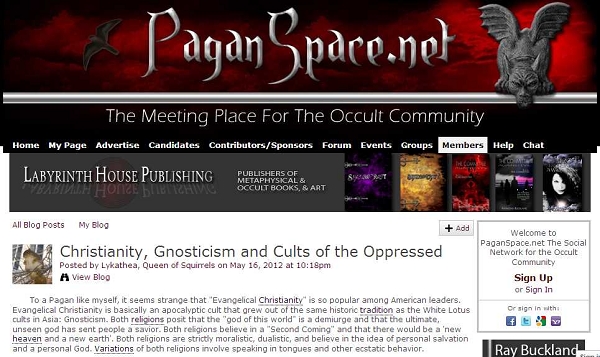To a Pagan like myself, it seems strange that "Evangelical Christianity" is so popular among American leaders. Evangelical Christianity is basically an apocalyptic cult that grew out of the same historic tradition as the White Lotus cults in Asia: Gnosticism. Both religions posit that the "god of this world" is a demiurge and that the ultimate, unseen god has sent people a savior. Both religions believe in a "Second Coming" and that there would be a 'new heaven and a new earth'. Both religions are strictly moralistic, dualistic, and believe in the idea of personal salvation and a personal God. Variations of both religions involve speaking in tongues and other ecstatic behavior.
Wikipedia tells me that the "Former Heaven" religions in Asia, also known as the 3-in-1 religions like I Kuan Tao, are actually a modern evolution of the White Lotus groups. IKT are cool people so I would not use the WL label except to describe their historical derivation. However, one group that would fit the White Lotus niche politically is Falun Gong. The White Lotus religions are generally followed by people who feel that they are oppressed, such as women and poor people. They are looking for a way out, and they have frequently overturned the government (because the Second Coming makes consequences moot). This is why the Chinese government dislikes Falun Gong, since there has been a long history of messianic cults leading to violence and war.
Christianity was originally intended as an anti-governmental cult as well. John the Baptist, and through him Jesus, was influenced by the Gnostic groups floating around Judea during that time period. I think we in the West all know the story of Christianity's Gnostic influences. White Lotus was also influenced by Greco-Egyptian Gnosticism, believe it or not. It was originally a form of Manichaeism, and traces of this still remain. For example, the ultimate god is a "bornless goddess" like the concept of Barbelo, and she sends the Maitreya Buddha to save humanity from sin and evil. The dualism found in historic White Lotus religions is a contrast to the traditionally tolerant Asian attitude toward "dark and light" elements of spirituality.
In a nutshell, these religions are geared toward people who are poor, oppressed, and looking for a way out. People in power in traditional societies followed religions similar to Roman state paganism. They worshipped gods of leadership and stability, like the Old Testament god. They did not talk about the Second Coming because that would mean the end of themselves. A leader could be a regular Mahayana Buddhist, because that is a religion based on personal salvation and balance. A leader could also be Jewish or any other sort of tribal monotheist. But the idea that such a form of Christianity is the 'power elite' is quite ironic to me, and is the sign of a rather fluid and unstable form of government. Even Catholicism is probably more stable and Paganesque than Evangelical.
One example of a historical king who was a true "Gnostic born again" believer was Akhenaten. He was rather discredited, to say the least. It is ironic that certain politicians would try to emulate his example in their fixation on religion and the requirement to be 'born again', even though one is a member of the power elite.
(Paganspace.net, May 16, 2012)

Original text from: http://www.paganspace.net/profiles/blogs/christianity-gnosticism-and-cults-of-the-oppressed